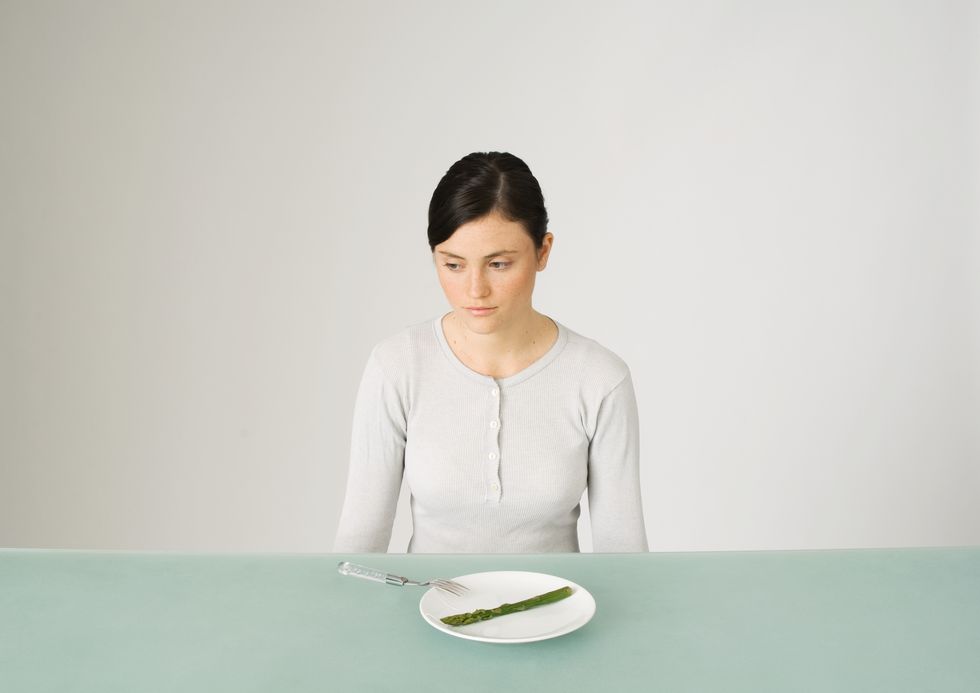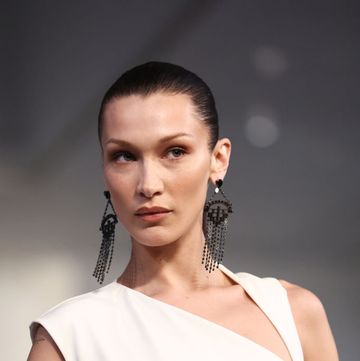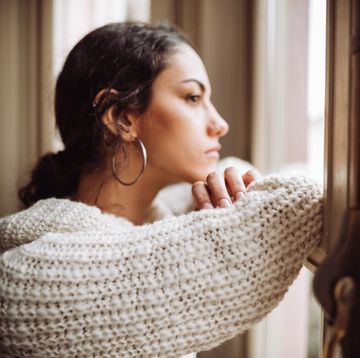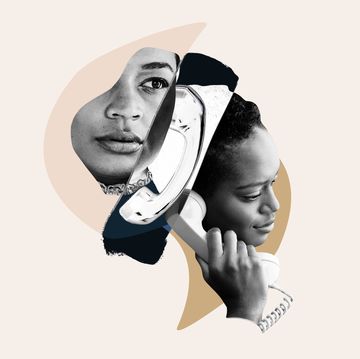'Safe' isn't usually how you'd describe the ingredients that make up a Christmas dinner. But for former anorexia sufferer Felicity Allman, a roast potato can present the most unlikely of threats.
'Carrots, parsnips, Brussels sprouts are all 'safe' foods. There's so much food available at Christmas that as long as your plate is stacked high with vegetables and you frequently say how stuffed you are, people don't notice how little you eat,' admits the 28-year-old.
Allman was diagnosed with clinical anorexia nervosa at the age of 25 after suffering from what is known as 'disordered eating' - abnormal eating behaviours that, by themselves, don't warrant diagnosis of an eating disorder - during her teens.
'I remember eating several apples a day during my A-levels and becoming fixated with porridge. There'd be days where I'd consume 20 pieces of fruit a day and nothing else,' she admits.
According to UK eating disorder charity, BEAT, an estimated 1.25 million people in the UK have an eating disorder, with approximately one in 250 women and one in 2,500 men affected by the mental illness.
Anorexia nervosa - a condition when a person tries to keep their weight as low as possible, be it through starvation or excessive exercise - has the highest mortality rate of any psychiatric disorder, with 20 per cent of sufferers dying premature from their illness.
'Many people don't realise how serious illnesses like anorexia are,' explains Dr Dasha Nicholls, Chair of the Royal College of Psychiatrists' Eating Disorders Faculty.
'Eating disorders can affect people of different weights, genders and ages - but many people still think about them as teenage girls "dieting gone wrong" or associate them with celebrity culture. This trivialisation leads to a stigmatising belief that eating disorders are self-inflicted and means professionals, families and friends may not pick up on the warning signs,' she adds.
However, for people struggling with an eating disorder at Christmas, the jubilation, constant talk of food and parties can become a psychological minefield, rather than a relaxing time for festive cheer.
'It is a time where food is central to any social calendar which can cause increased anxiety, pressure and feelings of guilt that they can't "join in" like they hoped,' explains a spokesman from BEAT.
Early signs of a problem
For Felicity, her issues with eating dated back to childhood.
'I was quite a fussy eater as a child and remember being at a party when I was 14-years-old and scoffing down food. One girl asked if I was worried about my weight. It was the first time I started thinking about my view of food.'
In the years that followed, the trainee mental health nurse began to restrict her daily food intake, living on a strict low carbohydrate diet and developing an unhealthy fixation with orthorexia - the obsessive pursuit of a healthy diet.
Felicity's obsession with weightloss worsened, however, in 2012 when she booked a Californian road trip with her then-boyfriend and his 17-year-old niece.
'She was gorgeous, petite and dainty like a bird,' she recalls. 'I remember thinking I couldn't be seen in holiday photos next to her, despite the fact my rational mind could see it was a ridiculous comparison - she was a very young looking 17-year-old. I immediately went on a low carb diet and couldn't stop.'
Over the years, Felicity began following pro-anorexic groups to help stay focused with her weight goal. One such group, dubbed '100lbs', instructed members to upload a picture of their scales every day to the website.
'If you weighed over 100lbs you were kicked out of the group and deemed unworthy of competing with the "pros",' she says.
She also learned what she refers to as 'clever tricks' to help manage her eating disorder, with preparation and deceit becoming key.
'If I knew I was going to a restaurant, I'd research the menu weeks in advance,' Allman admits.
'I once met my aunt for lunch at a local tapas bar in London and ordered a plate of green beans and wilted spinach. The atmosphere around the table was tangible. I knew everyone was looking at my food because what I'd ordered was completely ridiculous, but I had a sick pleasure in eating what I thought was 'pure' food while other people didn't,' she recalls.
While Felicity felt in control of her eating disorder, the same couldn't be said for her family and friends.
'I remember working out in a sports bra at the gym and my then-boyfriend came rushing over and told me to put a top on because he thought I looked ill. On another occasion, my mum came to stay and squeezed my leg while I was wearing a dressing gown and asked, "What's left of you?"'
Playing mind games
While it's widely believed Christmas is the worst time of year for an anorexia sufferer, Felicity remembers the festive season as the perfect chance to conceal her obsession with food.
From binning leftovers at lunch to loading her family's puddings with sugar and cream to make them 'lose' in what she saw was a weight loss competition, Christmas served the most opportune moment to manipulate her disorder and loved ones.
'If someone offered me a mince pie, I'd say: "No, I've had so many". Instead, I'd make the effort of going round with the plate of pies, encouraging everyone to have one so people wouldn't notice if I wasn't. It's quiet easy to trick people.
'I've got an image in my head of someone dropping gravy down themselves during a Christmas dinner and I remember thinking "you're a pig in the slop, how are you going to win and lose weight doing that". It's a vile way to think about the people you love.'
Dr Dasha Nicholls explains: 'People living with an eating disorder often feel deep shame and this leads to secrecy. I often seen patients who try to hide their behaviour because they know it wouldn't be seen as "normal" by other people.'
Thick wooly jumpers were also Felicity's go-to wardrobe choice to conceal her skeletal frame.
'No one is going to comment if you're wearing four jumpers because everyone is layered up. If you bundle up in the winter, it's easy,' she says.
As a result of malnutrition, Felicity also regularly suffered from low blood sugar levels and electrolyte disturbances.
'My main memory during this time was intense dissociation. You go around in a daze because you're so light-headed, not really knowing what is going on. I felt like a balloon with a string for a body, floating around.'
Looking to the future
Having suffered with the severity of her eating disorder (and a lack of periods) for the majority of her early twenties, Felicity finally decided to take action. Aged 25, she visited her GP for help.
Six months later, a trip to Hong Kong resulted in an unexpected change in mindset about food.
'Dim Sum is my favourite food and seeing as I'm vegetarian, I decided to eat whatever tasted good. For some reason on that holiday, I just let myself go and ate. I later remember being in a hotel room in Bangkok and getting my first period in months.'
While she doubts she'll ever have a normal relationship with food, Felicity is grateful not to find Christmas as triggering as it used to be.
'My eating isn't normal but, it's normal for me. It's a shame but the idea of coming home at the end of the day and cooking something delicious and nutritious is something I've never known,' she says.
'I'll indulge this Christmas but my boyfriend will probably have to say 'you don't need the whole box of Quality Streets' as I've been known to binge on sweet treats instead of eating proper meals.'
At this time of year, Felicity has a few warnings about how people should treat the subject of anorexia with family and friends.
'At Christmas, I strongly believe any mention of weight should be off limits. If someone with a clinical eating disorder has a 'safe food' they like, make sure there's plenty of it available because that could be the one thing keeping them alive. It's tricky, I know. I feel for the people who were around me during the worst moments of my disorder.
'I just wish I'd given into the rational voice in my head warning me that something was wrong and told someone I wasn't happy, sooner.'
To find further help and support, check out Mind's list of useful contacts and BEAT's helpline here.

Katie O'Malley is the Site Director on ELLE UK. On a daily basis you’ll find Katie managing all digital workflow, editing site, video and newsletter content, liaising with commercial and sales teams on new partnerships and deals (eg Nike, Tiffany & Co., Cartier etc), implementing new digital strategies and compiling in-depth data traffic, SEO and ecomm reports. In addition to appearing on the radio and on TV, as well as interviewing everyone from Oprah Winfrey to Rishi Sunak PM, Katie enjoys writing about lifestyle, culture, wellness, fitness, fashion, and more.
















